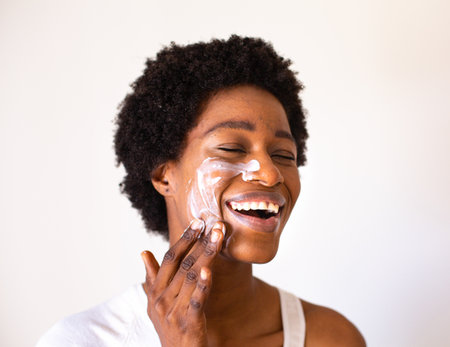1. Understanding Your Skin Type
Before you start building a sustainable and affordable skincare routine, its important to understand your skin type. Choosing the right products for your specific needs will help you achieve better results without wasting money on products that dont work for you.
How to Identify Your Skin Type
Your skin type determines how your skin reacts to different ingredients and environmental factors. Here’s a simple guide to help you identify yours:
| Skin Type | Characteristics |
|---|---|
| Oily | Shiny appearance, prone to acne and blackheads, larger pores. |
| Dry | Tight or flaky skin, rough texture, may feel irritated. |
| Combination | Oily in some areas (like the T-zone), dry in others. |
| Sensitive | Easily irritated, redness, reacts strongly to new products. |
| Normal | Balanced moisture levels, few breakouts or sensitivities. |
The Importance of Knowing Your Skin Concerns
Apart from your skin type, identifying specific concerns like acne, dark spots, or fine lines can help you choose the most effective products. Here are some common skin concerns and recommended ingredients:
| Concern | Recommended Ingredients |
|---|---|
| Acne & Breakouts | Salicylic Acid, Benzoyl Peroxide, Tea Tree Oil |
| Dullness & Uneven Tone | Vitamin C, Niacinamide, Alpha Arbutin |
| Aging & Fine Lines | Retinol, Peptides, Hyaluronic Acid |
| Sensitivity & Redness | Ceramides, Centella Asiatica, Oat Extract |
| Dryness & Dehydration | Squalane, Glycerin, Hyaluronic Acid |
Selecting Products That Work for You
Once youve determined your skin type and concerns, look for products with ingredients that suit your needs. Avoid buying trendy items just because they’re popular—stick to what works best for your skin.
A Few Tips for Choosing the Right Products:
- Avoid harsh ingredients: Alcohol-based toners or overly strong exfoliants can cause irritation.
- Simplify your routine: You don’t need 10 different products—start with the basics: cleanser, moisturizer, and sunscreen.
- Patches test new products: Always test new skincare items on a small area before applying them to your face.
- Sustainable choices matter: Look for refillable packaging and cruelty-free brands to make your routine more eco-friendly.
The First Step to an Effective Routine
Your skincare journey starts with knowing what your skin truly needs. By identifying your skin type and concerns early on, youll be able to build a routine that is both effective and budget-friendly.
2. Building a Minimalist Skincare Routine
Creating a skincare routine doesn’t have to be complicated or expensive. A minimalist approach focuses on essential products that keep your skin healthy while reducing waste and unnecessary spending. By sticking to the basics, you can achieve great results without overwhelming your skin or your budget.
The Three Essential Skincare Products
A simple yet effective skincare routine consists of three key products: cleanser, moisturizer, and sunscreen. These essentials help maintain clean, hydrated, and protected skin.
| Product | Purpose | How to Use |
|---|---|---|
| Cleanser | Removes dirt, oil, and impurities from the skin. | Use morning and night with lukewarm water. |
| Moisturizer | Keeps skin hydrated and strengthens the skin barrier. | Apply after cleansing while skin is still slightly damp. |
| Sunscreen | Protects against UV damage and premature aging. | Apply every morning as the last step in your routine. |
Selecting Budget-Friendly Products
You don’t need expensive skincare products to see results. Many drugstore brands offer high-quality cleansers, moisturizers, and sunscreens at affordable prices. Look for fragrance-free formulas with gentle ingredients suitable for your skin type.
Tips for Choosing Affordable Skincare Products
- Avoid unnecessary ingredients like artificial fragrances and dyes.
- Select multi-purpose products (e.g., a moisturizer with SPF).
- Read reviews and check ingredient lists before purchasing.
- Buy in larger sizes or value packs to save money over time.
Simplifying Your Routine for Sustainability
A minimalist skincare routine not only saves money but also reduces packaging waste. By limiting the number of products you use, you contribute to a more sustainable beauty routine. Consider choosing brands that use recyclable packaging or offer refillable options.
Sustainable Practices to Keep in Mind
- Use up what you have: Finish existing products before buying new ones.
- Avoid overuse: A little goes a long way—using too much product won’t enhance results.
- Select eco-friendly brands: Look for companies committed to sustainability efforts.
A well-planned minimalist skincare routine keeps your skin healthy while being cost-effective and environmentally friendly. By focusing on quality over quantity, you can maintain glowing skin without the excess clutter.
![]()
3. Choosing Affordable Yet High-Quality Products
Building a sustainable and budget-friendly skincare routine doesn’t mean you have to sacrifice quality. There are plenty of drugstore and budget-friendly brands that offer effective ingredients without costing a fortune. The key is knowing what to look for and how to make smart choices.
Look for Effective Ingredients
Many affordable skincare products contain the same active ingredients as high-end brands. Focus on these key ingredients when shopping:
| Skin Concern | Effective Ingredients | Budget-Friendly Options |
|---|---|---|
| Hydration | Hyaluronic Acid, Glycerin | Neutrogena Hydro Boost, The Ordinary Hyaluronic Acid |
| Aging & Fine Lines | Retinol, Peptides | CeraVe Resurfacing Retinol Serum, Olay Regenerist Micro-Sculpting Cream |
| Acne & Blemishes | Salicylic Acid, Benzoyl Peroxide | Clean & Clear Persa-Gel 10, La Roche-Posay Effaclar Duo |
| Sensitive Skin & Redness | Ceramides, Niacinamide | CeraVe Moisturizing Cream, Vanicream Gentle Facial Cleanser |
| Dullness & Dark Spots | Vitamin C, Alpha Arbutin | The Ordinary Ascorbic Acid 8% + Alpha Arbutin 2%, LOreal Revitalift Vitamin C Serum |
Avoid Unnecessary Additives
Avoid products with unnecessary fillers like artificial fragrances, dyes, and alcohol that can irritate your skin. Instead, choose simple formulas with proven ingredients.
Shop Smart and Compare Prices
- Check Drugstores and Online Retailers: Many affordable brands are available at stores like Target, Walmart, CVS, and online platforms like Amazon.
- Buy in Bundles or Value Sets: Some brands offer value packs that provide more product for a lower price per unit.
- Look for Sales and Coupons: Sign up for store rewards programs or watch for seasonal discounts.
- Select Multi-Purpose Products: A moisturizer with SPF or a cleanser with exfoliating properties can help cut down on extra purchases.
Sustainable and Budget-Friendly Choices Exist!
You don’t need expensive skincare to achieve healthy skin. By focusing on effective ingredients, avoiding unnecessary additives, and shopping smartly, you can build a skincare routine that is both affordable and sustainable.
4. Sustainable Skincare Practices
Building a skincare routine that is both sustainable and affordable doesn’t have to be complicated. By making small changes, you can reduce waste, support eco-friendly brands, and still take great care of your skin. Here are some easy ways to make your skincare routine more sustainable.
Choose Refillable and Minimal Packaging Products
Many skincare brands now offer refillable options that help reduce plastic waste. Instead of buying new bottles every time, you can purchase refills that use less packaging.
| Product Type | Sustainable Alternative |
|---|---|
| Cleansers | Refillable or bar cleansers with minimal packaging |
| Toners | Glass bottles with refill options |
| Moisturizers | Refillable jars instead of single-use containers |
| Sunscreens | Eco-friendly packaging and reef-safe formulas |
Reduce Skincare Waste
Avoid unnecessary waste by using multi-purpose products, opting for biodegradable wipes, and recycling empty containers. Try to finish what you have before buying new items to minimize waste.
- Multi-use products: Choose moisturizers with SPF or tinted sunscreens to cut down on extra products.
- Bamboo or reusable cotton pads: Replace single-use cotton rounds with washable alternatives.
- Simplify your routine: Stick to the essentials—cleanser, moisturizer, and sunscreen—to avoid overconsumption.
Support Sustainable Skincare Brands
If you’re looking for new products, consider brands that focus on sustainability. Many companies now use ethically sourced ingredients, cruelty-free formulations, and recyclable packaging. Supporting these brands helps promote more responsible skincare practices.
What to Look for in Sustainable Brands:
- Cruelty-free & vegan: Ensure the brand does not test on animals.
- Sustainably sourced ingredients: Look for organic and fair-trade certifications.
- ECO-friendly packaging: Choose glass, metal, or compostable materials over plastic.
- B-Corp certification: This certification indicates a company meets high environmental and social standards.
Create a Long-Term Sustainable Routine
The key to maintaining an eco-friendly skincare routine is consistency. By making mindful choices about the products you use and how you dispose of them, you can take care of your skin while also being kind to the environment.
5. Consistency and Long-Term Benefits
One of the most important aspects of a sustainable and affordable skincare routine is consistency. Sticking to your routine allows your skin to adjust to the products and show results over time. Constantly switching products can not only be expensive but may also disrupt your skin’s natural balance, leading to irritation or breakouts.
Why Consistency Matters
Your skin needs time to respond to active ingredients. Most skincare products, especially treatments like retinol, vitamin C, and chemical exfoliants, take weeks or even months to show noticeable improvements. If you frequently change products before giving them enough time to work, you might never see their full benefits.
How Long Should You Wait?
Patience is key when it comes to skincare. Here’s a general timeline for common skincare products:
| Product Type | Average Time to See Results |
|---|---|
| Moisturizer | A few days to a week |
| Sunscreen | Immediate protection, long-term anti-aging effects after months |
| Vitamin C Serum | 4-12 weeks |
| Retinol | 8-12 weeks for visible changes |
| Chemical Exfoliants (AHAs/BHAs) | A few weeks for smoother skin |
Avoid Unnecessary Product Switching
The beauty industry constantly introduces new “must-have” products, but that doesn’t mean you need to try them all. Instead of chasing trends, focus on what works for your skin type and concerns. Unless you experience irritation or an allergic reaction, give your products enough time to deliver results before making changes.
Tips for Staying Consistent
- Create a simple routine: A basic regimen with cleanser, moisturizer, and sunscreen is often enough.
- Set reminders: If you tend to forget steps in your routine, set phone alerts or keep products in visible areas.
- Avoid overcomplicating: Too many steps can be overwhelming and difficult to maintain.
- Track progress: Take photos every few weeks to monitor improvements instead of relying on daily observations.
A sustainable and affordable skincare routine isn’t about using the latest expensive product—it’s about finding what works and sticking with it. By staying consistent, you’ll allow your skin the time it needs to improve while avoiding unnecessary spending on new products.


